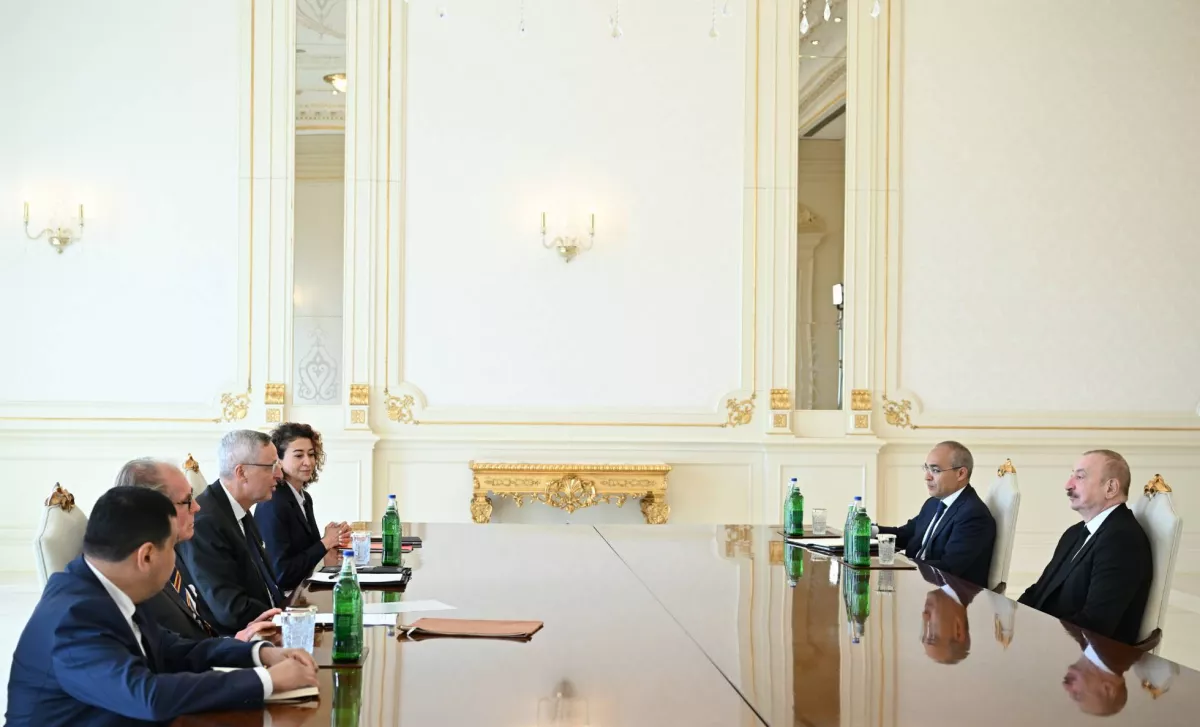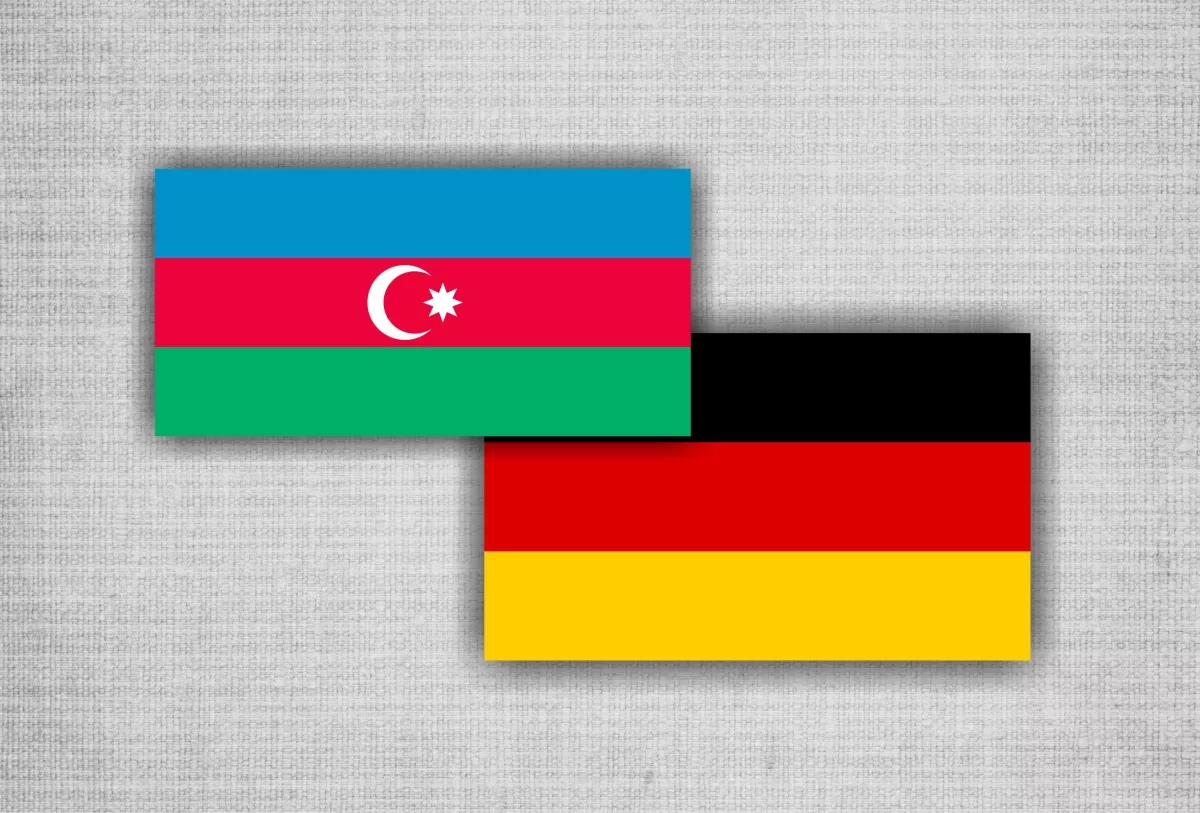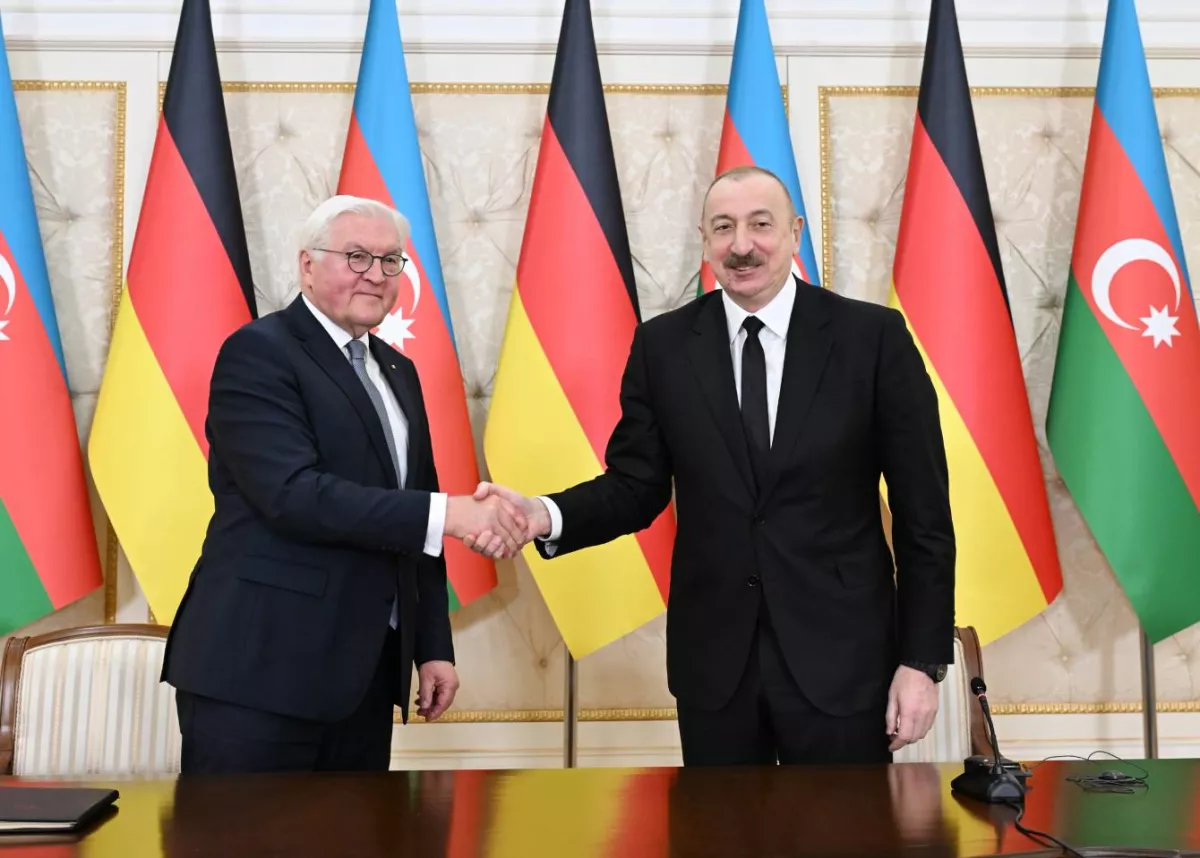From Caspian to Rhine Baku and Berlin strengthen cooperation
Germany ranks among the leading European countries with which Azerbaijan maintains successful cooperation not only in the energy sector and trade, but also in non-oil industries. German businesses are actively involved in major industrial projects in Azerbaijan. Both Baku and Berlin are determined to expand their partnership on the business front.
Recently, President of Azerbaijan Ilham Aliyev discussed prospects for Azerbaijani-German business cooperation with Michael Harms, Chairman of the German Eastern Business Association, who arrived in Baku. On the same day, a roadmap for economic projects was signed between the Eastern Business Association and the Azerbaijan Export and Investment Promotion Agency (AZPROMO).
Established in 1952, the German Eastern Business Association (Ost-Ausschuss) has strong traditions and considerable experience in promoting German companies in the markets of Eastern and Southern Europe, as well as the post-Soviet region, including the South Caucasus and Central Asia. The organisation monitors current market trends and demand, organises delegation visits, and holds industry-specific conferences, connecting German businesses and government institutions with more than two dozen partner countries through an extensive network of contacts with key local business counterparts. Notably, the Ost-Ausschuss has long maintained active cooperation with Azerbaijani government agencies and business circles, fostering new business initiatives.

During the meeting held on May 30, the importance of the President of Azerbaijan’s engagements with the leadership of the German Eastern Business Association, as well as with representatives of German business circles and companies, was positively noted. The role of German President Frank-Walter Steinmeier’s visit to Azerbaijan in April in expanding bilateral economic ties was also highlighted. The meeting included an exchange of views on the prospects for economic cooperation, with participants emphasising that Azerbaijan’s favourable investment climate continues to encourage German business activity in the country.
In particular, Michael Harms noted that a Roadmap for joint economic projects would be signed with AZPROMO as part of his visit, underlining that this initiative enjoys strong political support from the President of Azerbaijan.
According to information provided to Caliber.Az by the Azerbaijani Ministry of Economy, the “Roadmap for Expanding Trade, Economic and Investment Relations between Azerbaijani and German Companies” will be signed by the Ost-Ausschuss, AZPROMO, and the German-Azerbaijani Chamber of Commerce.
“We held discussions with Michael Harms, Chairman of the Eastern Committee of the German Economy on expanding cooperation in the field of energy within the Green Energy course of Azerbaijan,” Azerbaijani Energy Minister Parviz Shahbazov wrote on his X (formerly Twitter) page. “We evaluated the cooperation opportunities with German companies on the development of offshore wind energy, the Green Energy Corridor, which will extend from the Caspian Sea to Europe, and the supply of energy through this infrastructure.”
Specifically, this refers to the planned construction of the Black Sea Energy submarine cable — a 1,195-kilometre-long, 1-gigawatt power line to be laid along the seabed of the Black Sea. According to preliminary estimates, the cable’s capacity will allow for the annual transmission of up to four gigawatts of green electricity.
Overall, cooperation in the field of renewable energy sources (RES) is among the most promising areas of Azerbaijani-German business relations. This trend was also discussed earlier this year in April, during the visit of German President Frank-Walter Steinmeier to Azerbaijan.
“In January and February of this year, our trade turnover increased nearly threefold. The primary reason for this has been the increase in the volume of crude oil exported from Azerbaijan to Germany. Therefore, we believe that we should take more active steps in the coming years to diversify our trade,” said President of Azerbaijan Ilham Aliyev during a joint press statement with his German counterpart.
The Azerbaijani president highlighted renewable energy (RES) as one of the top priorities, noting that German companies possess vast expertise in this sector. At the same time, Azerbaijan itself has a comprehensive programme and ambitious plans for green energy development: “We intend to increase the production of renewable energy to 6 gigawatts by 2030 through foreign investments, and this goal is quite realistic. Part of this volume will be exported to Europe.”

Another promising area in Azerbaijani-German business cooperation is joint initiatives in the transport and logistics sector, building on the potential of the Middle Corridor. “Your country plays a role in Germany's trade relations not only with Central Asia, but also with the Far East, including Southwest Asia and China. We know that the possibilities of the existing roads are limited. The roads passing through your country, as well as the role of the Middle Corridor, are important for the German economy and represent a good prospect. This will be even more interesting,” noted the President of Germany during his recent visit to Azerbaijan.

In recent years, German transport and logistics companies have intensified their cooperation with the Baku International Sea Trade Port (BISTP) and are exploring investment opportunities in the adjacent Alat Free Economic Zone (FEZ). At the same time, as Europe’s leading economy, Germany also plans to take part in the European Commission’s long-term programme aimed at supporting infrastructure initiatives along the Trans-Caspian International Transport Route (TITR) in Central Asian countries and Azerbaijan. The goal is to integrate the Black Sea–Caspian region states into the Trans-European Transport Network (TEN-T) through the creation of a South-East axis.
Azerbaijan has traditionally placed great importance on developing trade, economic, and investment cooperation with Germany — the driving force of the European economy, whose nominal GDP reached $4.7 trillion in 2024. Azerbaijani-German business partnership is built on a robust legal and contractual framework: to date, more than 80 bilateral agreements have been signed between the two countries. In addition, around 200 German companies are registered in Azerbaijan, approximately 170 of which are members of the German-Azerbaijani Chamber of Commerce.
German companies are actively involved in a wide range of projects across various sectors — including industry, construction materials production, agriculture, electric power, telecommunications, green energy initiatives, economic digitalisation, as well as the modernisation of ports, railways, and other transport infrastructure. Meanwhile, the volume of mutual investments between Azerbaijan and Germany currently exceeds $1.5 billion.
The scale of trade relations is equally impressive: Azerbaijan accounts for approximately 70% of Germany’s total trade with the South Caucasus region. Despite global crises and economic slowdowns, bilateral trade has continued to grow dynamically. In 2022, mutual trade turnover amounted to $1.3 billion, and in 2023 it rose by 45.4%, reaching $1.8 billion.
Azerbaijan’s exports to Germany have traditionally been dominated by oil supplies, with Germany ranking among the top ten buyers of Azerbaijani crude. Since the launch of the Southern Gas Corridor, the German energy trader Uniper SE has emerged as the largest buyer of Azerbaijani gas in Southern Europe. However, despite energy resources making up the bulk of Azerbaijani exports, in recent years the country’s non-oil sector has significantly increased its deliveries to the German market.
According to data provided to Caliber.Az by Azerbaijan’s Ministry of Economy, the volume of Azerbaijani-German trade exceeded $1.6 billion in 2024 and surpassed $600 million in the period from January to April 2025.
In recent years, Azerbaijan’s export portfolio to Germany has seen a growing share of wine products, juices made from fresh and processed fruits and vegetables, dried fruits, hazelnuts, and tea. The country has also begun supplying petrochemical products, non-ferrous and ferrous metals, as well as mechanical equipment and components manufactured within Azerbaijan’s industrial clusters.
On the other hand, German exports to Azerbaijan last year were dominated by passenger cars, other vehicles and spare parts, ferrous metallurgy products, electrical equipment, electronics, optical, medical, photographic and other precision instruments, pharmaceutical products, cosmetics, jewellery, paper and cardboard products, various food items, household chemicals, textiles, and more.








